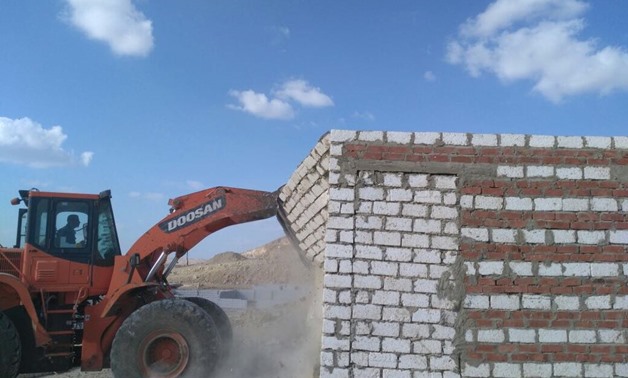
Government removed an illegal building on agricultural lands- Press photo/ Minister of Water Resources and Irrigation
CAIRO – 11 January 2018: Egypt’s House of Representatives approved new amendments to the Agriculture Law on Monday, imposing tougher penalties on building on arable land, a move experts see as insufficient.
As per these amendments, building on arable lands is banned and violators could face penalties punishable by up two to five years in prison and a fine ranging between LE 100,000 (US$ 5,648) and LE 5 million. The old articles to the Agriculture Law stipulated that building on lands or changing the arable land to non-agricultural was punishable with up to a 6-month imprisonment and a fine ranging between LE 10,000 and LE 50,000.
The new amendments, which were drafted by the Ministry of Water Resources and Irrigation, did not change the label of encroachment as “violation.”
“The new penalties might be (deterrent) enough, but as long as there are some exceptions allowed to the minister, the situation does not change,” an agriculture engineer and former head of Ismailia Agricultural Directorate Houssam Reda told Egypt Today on Thursday.
Under the applicable law, Article 152 stipulates that the minister, in cooperation with the minister of Utilities and Urban Development, has the right prevent the encroachment ban on a piece of agricultural land located within an urban area.
Toughening penalties will not restore the land after being encroached as cement building turns it to moor, Yahia Metwaly, an agricultural expert at the Agricultural Research Center, told al-Tahrir newspaper on November 21, 2017.
The encroachments include illegal construction on the Nile’s banks, unlicensed fish farming, as well as industrial waste and other forms of pollution. Since January 2015, the Ministry has launched a campaign to remove violations detected by the government on the Nile banks. According to the Ministry’s latest data, which was announced in July, a total of 26,322 violations of encroachment on the Nile banks have been removed. Since March 2017, a total of 12,425 cases of encroachment were removed, according to data.
Egypt’s agricultural lands cover 10 million feddans (one feddan equals about 1.038 acres) in 2015, compared to 9.6 million feddans in 2010, the Central Agency for Public Mobilization and Statistics (CAPMAS) noted in a report issued on September 19, 2016.
Since the January 25 revolution in 2011, a total 80,000 feddans were encroached but most cases were upheld, the Ministry of Agriculture’s Spokesperson Hamid Abdel-Dayem told Egypt Today on Thursday.
According to World Bank data, Egypt’s agricultural areas on the country’s whole land increased to 3.6 percent in 2015, compared to 2.6 percent in 1961.
However, Egypt’s arable lands face other challenges, not only the encroachment. Declined access to water and potential threats of climate change cause problems to Egypt, according to a report issued by the Food and Agriculture Organisation (FAO) in cooperation with Egypt’s Ministry of Agriculture and Ministry of Water Resources in March 2013.
In 2016, Egypt’s Minister of Water Resources and Irrigation said the country suffers water scarcity and will face much tougher situations due to increasing demand, amid its difference with Nile upstream countries of Ethiopia and Sudan over building the controversial Ethiopia’s Grand Renaissance Dam (EGRD). Egypt has voiced its concern over Ethiopia’s dam construction, as it would affect Cairo’s 55-cubic meter share of the Nile water. However, Addis Ababa sees the dam is necessary for its development and would not negatively affect the downstream countries (Egypt and Sudan).
.jpeg)
In August 2017, an unverified document related to the Ministry of Irrigation demonstrated potential desertification of one million feddans (1.04 million acres), with five million people losing their sources of income in return, said Mohammed El-Baz, a broadcaster of El Mehwar Channel’s “90 Minutes”.
In a move to increase Egypt's arable land, the government launched in 2015 the first phase cultivating a total of 4 million feddans nationwide, depending on pumping water out of five renewable and non-renewable aquifers to mitigate current problems for a country of 105 million Egyptian domestically and abroad.

.jpeg)
Comments
Leave a Comment